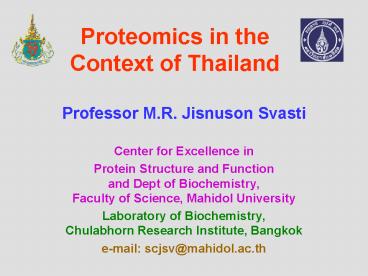Proteomics in the Context of Thailand
1 / 19
Title:
Proteomics in the Context of Thailand
Description:
and Dept of Biochemistry, Faculty of Science, Mahidol University ... Protein & Enzyme Research in Biochemistry Section of 27th STT Conference. Enzymes (34 ... –
Number of Views:87
Avg rating:3.0/5.0
Title: Proteomics in the Context of Thailand
1
Proteomics in the Context of Thailand
- Professor M.R. Jisnuson Svasti
- Center for Excellence in
- Protein Structure and Function
- and Dept of Biochemistry,
- Faculty of Science, Mahidol University
- Laboratory of Biochemistry,
- Chulabhorn Research Institute, Bangkok
- e-mail scjsv_at_mahidol.ac.th
2
Roles of Proteins
- Proteins are the instruments through which the
genetic potential of an organism are expressed - Proteins are involved in almost all processes of
body and fulfil many functions - Functions of Proteins
- enzyme catalysis, transport, mechanical
support, organelle constituents, coordinated
motion, storage reserves, metabolic control,
sensory perception, protection mechanisms,
toxins, and osmotic pressure
3
Importance of Studying Proteins
- Human Genome Data - complete, but does not show
how proteins function - or how biological
processes occur - Proteins sometimes chemically modified after
synthesis - Proteolytic cleavage, hydroxylation,
oxidation, carboxylation, methylation,
acetylation, phosphorylation, glycosylation,
transamidation, crosslinkage - Proteins also fold into specific
three-dimensional structure which determines
function
4
Some covalent post-translational modifications
5
Approaches for Study of Proteins
- Purification, characterisation of properties
primary structure - Study of molecular mechanism of action -
correlation of structure activity drug design
- need 3-D structure - X-ray crystallography
(n.m.r. for small mols) - Changes in expression and/or properties of
proteins - proteomics approach - study all
proteins at all states at all times
6
2-DE Comparison of Proteins from two different
conditions
From Pandey Mann, 2000
7
Sample preparation First dimension IEF
Second dimension SDS-PAGE Protein detection
Image analysis Identification - Edman
Degradation - MALDI-TOF -
Nanospray/MS/MS Bioinformatics - Protein
Informatics
8
Defining proteomics
- 1. Proteomics-the classical definition
- Two-dimensional gels of cell lysates and
annotation - Two-dimensional gels to visualize differential
protein expression
- 2. Proteomics-in the post-genomic era
- Protein identification
- Post-translational modifications
- Protein-protein interaction
Pandey and Mann. Nature, 405, 2000
(www.nature.com)
- 2-D HPLC
- Affinity purification
9
Protein Enzyme Research in Biochemistry Section
of 27th STT Conference
- Enzymes (34)
- Purification and catalytic properties of enzymes
- Screening enzyme activities in microorganisms
- Applications-orientated studies
- Less on basic studies of mechanism and tertiary
structure, and site directed mutagenesis - Protein/Enzyme and DNA/RNA (24)
- cloning, sequencing and expression.
- Proteins (6)
- some characterisation of mutations
- 1-2 proteomic studies
10
Equipment Available for Research on Protein
Structure in Thailand
- E-mail survey of some 30 departments at different
universities - Amino Acid Analysis
- Protein Sequencer
- 2-D Electrophoresis
- MALDI/TOF ESI/MS/MS or MS/MS
- Circular dichroism, protein NMR
- Macromolecular X-ray crystallography
- Computer modelling of protein structure
- Currently available/ in routine operation or not
- Planned to obtain in 2 years
11
Amino acid analysis Protein sequencer
- Amino Acid Analysis
- CRI HPLC method, in routine operation
- FS-MU amino acid analyser not operating
- Protein Sequencer
- CRI in routine operation obsolete
- FS-MU - not operating
- IMBG-MU operating?
- BIOTEC/NSTDA operating?
- Rice Research unit, Pathumthani - new
12
Proteomic Equipment
- 2-D Electrophoresis
- CRI routine
- BIOTEC/NSTDA routine
- FS-MU routine
- IMBG- MU planned
- Others planned
- MALDI/TOF, ESI/MS/MS,
- MS/MS
- FS- Chula MALDI/TOF (Bruker)
- FS-ChiangmaiQTOF II-new
- Rice Research unit, MALDI/TOFABI-new
- IMBG-MU MS/MS ?
- BIOTEC MALDI/TOF -PSD Bruker - new
- Thaksin U- Ion trap MS -new
- CRI planned?
13
3-D Structure and Conformation
- CD/ Protein NMR
- IMBG-MU Circular Dichroism
- Macromolecular X-Ray facilities
- FS-MU planned
- BIOTEC/NSTDA - planned
- Computer Modelling of Protein 3-D Structure
- FS-MU
- IMBG-MU
- BIOTEC/NSTDA
- FS-Kasetsart
- Others
14
Conclusions
- New equipment available or soon to be available
for protein research - But much existing equipment not in routine
operation - Not broken down because of intensive use
- Not operational because not used for a long time,
so condition deteriorates - Lack of qualified manpower to operate properly
15
Institutions Equipped and Active for Protein
Research
- Faculty of Science, Mahidol University
- Institute of Molecular Biology and Genetics,
Mahidol University - BIOTEC/ NSTDA
- Chulabhorn Research Institute
16
Proteomics Research in Thailand
- Chulabhorn Research Institute
- Protein changes in cancer thyroid,
cholangiocarcinoma - Proteomics of cancer cells anti-cancer agents
- TARUN program, NSTDA/BIOTEC
- Proteomics of malaria
- Faculty of Science, Chiangmai University with
Academica Sinica, Taipei - Proteomics of snake venom
- KMUTT with Academica Sinica, Taipei
- Proteomics of rice hull
17
Other Areas for Proteomic Research in Thailand
- Proteomics of Parasite Vectors
- Mosquito
- Faculty of Science, Mahidol University
- Shrimp Proteomics
- Disease resistant and disease tolerance
- Faculty of Science, Mahidol University
- Rice Proteomics
- Insect resistance
- Salt tolerance or drought tolerance
- Rice Research Institute ? Collaboration ?
18
Networking and Resource Sharing
- Since protein research requires expensive
hardware, we should consider to - form links and networks to share expertise
- set up core laboratories for routine services
- Make sure that all equipment functions
- Quality personnel, supervised by leader actively
engaged in research - encourage collaboration to provide access to
equipment and maximise utilisation - Most equipment does not breakdown through
overuse, but degenerates through lack of use - Equipment becomes outdated quickly
- Both collaboration or charging are possible
19
International Linkages
- Assistance for analyses needed for some
specialist equipment not available here - Sending samples for analysis
- Thai staff travel abroad with sample
- Charge or collaboration ?
- Student Research Abroad (e.g. RGJ)
- Should be collaboration between Thai and overseas
in formulation of project - Students should do research both locally and
overseas - Should strenghten local graduate program































